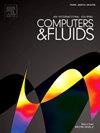Spatial–temporal prediction model for unsteady near-wall flow around cylinder based on hybrid neural network
Abstract
A hybrid neural network based on Densely Connected Convolutional Networks (DenseNet), Convolutional Long Short-Term Memory Neural Network (ConvLSTM), and Deconvolutional Neural Network (DeCNN) is employed to predict unsteady flow fields. The utilization of DenseNet makes the model more compact and makes the prediction of three-dimensional flow affordable. The ConvLSTM is implemented to predict multiple future time steps which improves prediction efficiency. The proposed model transforms the time sequences of velocity and pressure fields into uniform spatial–temporal topology as input and captures nonlinear feature information in the spatial–temporal domain. Numerical simulations are conducted for the flow around cylinder at different Reynolds numbers and the near-wall flow around cylinder with different gap ratios, and training samples for the neural network inputs are established. The predicted results are compared with the numerical simulation results, showing good agreement. From the prediction cycle, it can be seen that good prediction results can be maintained in the first three prediction cycles. The prediction results of the three-dimensional unsteady flow around a cylinder near a plane wall, exhibit remarkable accuracy, successfully capturing the evolution of turbulent vortex structures. This signifies that the prediction model is highly effective in capturing the spatial–temporal variations of complex unsteady flows.

 求助内容:
求助内容: 应助结果提醒方式:
应助结果提醒方式:


